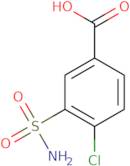4-Chloro-3-sulfamoylbenzoic acid
CAS: 1205-30-7
Ref. 3D-FC02107
| 25g | Descatalogado | ||
| 50g | Descatalogado | ||
| 100g | Descatalogado | ||
| 250g | Descatalogado | ||
| 500g | Descatalogado |
Información del producto
- 3-(Aminosulfonyl)-4-chlorobenzoic acid
- 3-(Aminosulfonyl)-4-Chloro-Benzoicaci
- 3-(Aminosulfonyl)-4-chlorobenzoic Acid
- 3-Sulfamoyl-4-chlorobenzoic acid
- 3-Sulfamyl-4-chlorobenzoic acid
- 4-Chloro-3-(aminosulfonyl)benzoic acid
- 4-Chloro-3-Sulfaminebenzoic Acid
- 4-Chloro-3-Sulfamoyl-Benzoicaci
- 4-Chloro-3-Sulfamoylbenzoate
- 4-Chloro-3-Sulfamoylbenzoic Acid
- Ver más sinónimos
- 4-Chloro-3-Sulfomulbenzoic Acid
- 4-Chloro-3-Sulfonamidobenzoic Acid
- 4-Chloro-3-Sulphamoylbenzoic Acid
- 4-Chloro-5-Sulphamoylbenzoic Acid
- 4-Chloro-5-sulfamoylbenzoic acid
- Benzoic acid, 3-(aminosulfonyl)-4-chloro-
- Benzoic acid, 4-chloro-3-sulfamoyl-
- Csba
4-Chloro-3-sulfamoylbenzoic acid (4CSB) is a drug that is used to treat distal renal tubular acidosis. It binds to the group P2 subunit of the Na+/H+ exchanger in proximal and distal tubules, which prevents its function and leads to increased pH of urine. 4CSB has been shown to be effective in clinical trials involving patients with colorectal adenocarcinoma and protocatechuic acid (PCA) levels higher than 500 μM. PCA was found to be associated with a lower risk of tumor recurrence and death. PCA also inhibits the growth of human colorectal adenocarcinoma cells by inhibiting cell proliferation and inducing apoptosis.





